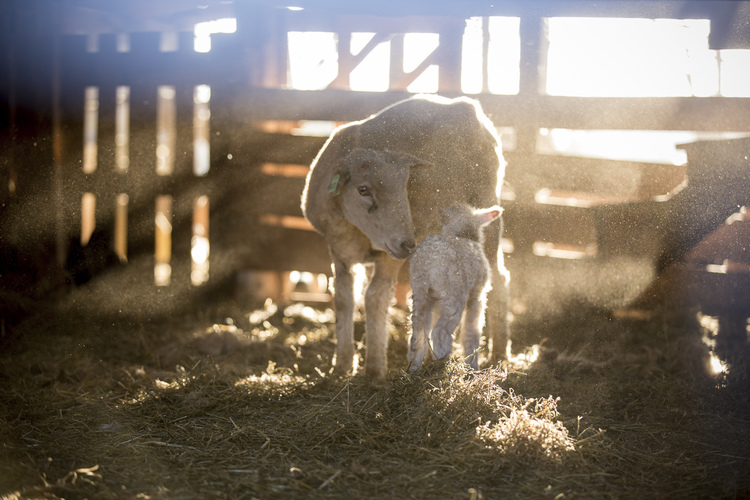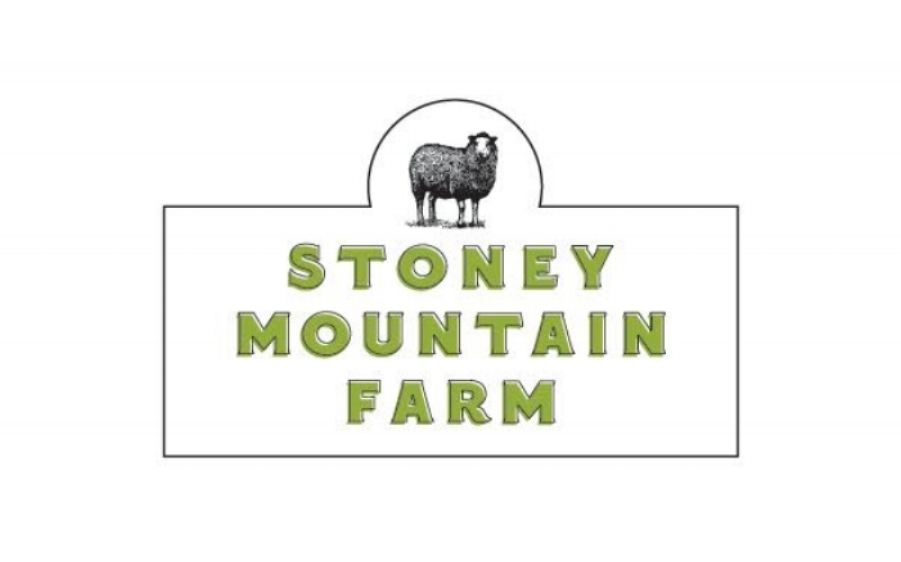

The Harvest Awe: Finding Beauty in the Farmer's Bounty
Forget the fussy florals this year. I found myself in awe of the crispness and beauty of the farmer's market haul, realizing the colors and forms of produce like radicchio, persimmons, and artichokes offer perfect, organic elegance. I used this bounty—cradled by kale—as my Thanksgiving centerpiece. It proves that the truest, simplest beauty for any occasion is found right where Mother Nature left it.

The Unending Circle: Embracing Life and Death on Our Sheep Farm
You can't be a farmer and fear the cycle. You learn to hold both—the beginning and the end—with respect. You see that one so often exists to support the other. It’s a harsh, beautiful, and unending rhythm.

The Dirt on Dreams: The Joy and Challenges of Leaving Your 9-to-5 for a Farm
When I told people I was leaving my steady job to start a farm, the reactions were, to put it mildly, varied. Some romanticized it, picturing me in a sun-drenched field. Others looked at me like I'd lost my mind.
The truth is, it's both exhilarating and exhausting. The joy of feeling the soil between my fingers and watching a seed I planted grow is a feeling no corporate bonus could ever replicate. But it’s not all sunshine and heirloom tomatoes. There are days of bad weather, pests, and endless repairs. The financial uncertainty and physical labor are a constant reality check.
Still, I wouldn't trade it. Even on the hardest days, there's a deep satisfaction in building something with my own hands, connected to the land. The joy of living a life that feels authentic is a reward worth every bit of the struggle.

Against All Advice: I Traded My Suit for Carhartts at 47
Against all the friendly advice of others, I took a leap of faith and haven’t regretted one moment.

Woven Together: How wool changed my life
The amazing natural properties of wool captured me, taught me, and transformed my understanding of sustainable living. Wool is a renewable resource that offers numerous benefits beyond its cozy warmth.

Tales of a female farmer
Women make wonderful farmers. Embracing our feminine and masculine sides can be a challenge, especially living a farmHer’s life.

From City Lights to Farm Nights: Olga's First Chapter in the Dirt
In "From City Lights to Farm Nights," follow Olga as she navigates the steep learning curve of becoming a farmer at 47, discovering muscles she never knew she had, and finding joy (and despair!) in her surprising new life.


-
January 2026
- Jan 31, 2026 The Architecture of a Slower Life: From briefcase to grain sack Jan 31, 2026
-
December 2025
- Dec 12, 2025 The Magic of Pan-Banging Ginger Molasses Cookies Dec 12, 2025
- Dec 2, 2025 The Harvest Awe: Finding Beauty in the Farmer's Bounty Dec 2, 2025
-
November 2025
- Nov 5, 2025 The Unending Circle: Embracing Life and Death on Our Sheep Farm Nov 5, 2025
-
October 2025
- Oct 23, 2025 The Scent of a Memory: How My Mother’s Pillowcase Brought Me Back to My Senses Oct 23, 2025
- Oct 7, 2025 When Life Upends the Chore Chart: A Hard-Won Lesson in Farm Preparedness Oct 7, 2025
-
September 2025
- Sep 30, 2025 Breeding season is underway Sep 30, 2025
- Sep 4, 2025 Buzz, Baa, and Felt! A Sweet New Workshop is Coming to the Farm Sep 4, 2025
-
August 2025
- Aug 13, 2025 The Dirt on Dreams: The Joy and Challenges of Leaving Your 9-to-5 for a Farm Aug 13, 2025
-
July 2025
- Jul 31, 2025 Mutton: It's a Flavor, Not Just an Age! Jul 31, 2025
- Jul 14, 2025 The Lines We Live: Can We Truly Understand Aging? Jul 14, 2025
- Jul 1, 2025 When the Stars Align: A Blackberry Bonanza! Jul 1, 2025
-
June 2025
- Jun 9, 2025 Our Holistic Approach to Sheep Healthcare: Continued Jun 9, 2025
-
May 2025
- May 21, 2025 Against All Advice: I Traded My Suit for Carhartts at 47 May 21, 2025
- May 19, 2025 Embrace the Earth: The Surprising Benefits of Wool Sponges May 19, 2025
-
March 2025
- Mar 31, 2025 Skirting Wool: The Essential First Step to Beautiful Fiber Mar 31, 2025
- Mar 17, 2025 Do Sheep Need a Barn? The Answer is in Their Wool! Mar 17, 2025
-
February 2025
- Feb 23, 2025 Cherishing Culinary Heirlooms: My favorite Kitchen Utensil Feb 23, 2025
- Feb 11, 2025 Wool Pellets Feb 11, 2025
- Feb 6, 2025 Fresh from the dirt: Horseradish Sauce Feb 6, 2025
- Feb 3, 2025 Lamb Fagioli Feb 3, 2025
-
January 2025
- Jan 15, 2025 Woven Together: How wool changed my life Jan 15, 2025
-
December 2024
- Dec 5, 2024 Seventeen Years of Sheep, Sweat, and Manchego: A Love Story Dec 5, 2024
-
September 2024
- Sep 10, 2024 Back to basics with sheep healthcare Sep 10, 2024
- Sep 10, 2024 Mac and Cheese Bites Sep 10, 2024
-
August 2024
- Aug 12, 2024 Tales of a female farmer Aug 12, 2024
-
July 2024
- Jul 12, 2024 Caring for sheep hides Jul 12, 2024
- Jul 11, 2024 Cucumber Lemonade Jul 11, 2024
- Jul 1, 2024 Cucumber Gazpacho Jul 1, 2024
-
May 2024
- May 23, 2024 Almonds, Sweet and Spicy May 23, 2024
-
January 2024
- Jan 17, 2024 Sheep Fencing Gone Wrong: A Comedy of Errors Jan 17, 2024
- Jan 17, 2024 From City Lights to Farm Nights: Olga's First Chapter in the Dirt Jan 17, 2024
-
April 2023
- Apr 3, 2023 The journey to vegetarian, or not? Apr 3, 2023
-
March 2023
- Mar 20, 2023 Making sense of scents, or not... Mar 20, 2023
-
February 2023
- Feb 26, 2023 Lamb Sliders Feb 26, 2023
-
March 2022
- Mar 15, 2022 HOW TO BE THE BEST SHEPHERD: Lessons from a sheep Mar 15, 2022
-
January 2022
- Jan 17, 2022 Lamb Bone Broth /Stock Jan 17, 2022
-
April 2021
- Apr 26, 2021 Farming through Covid Apr 26, 2021
-
June 2020
- Jun 19, 2020 Turning 60 Jun 19, 2020
-
January 2020
- Jan 12, 2020 Your Wool Dryer Balls: What You Should Know (and Why It Matters) Jan 12, 2020
-
September 2019
- Sep 10, 2019 The Shepherd's Lesson: Sometimes, the Sheep Know Best Sep 10, 2019
-
June 2019
- Jun 21, 2019 Weaning: A Shepherd's Reflection on Loss Jun 21, 2019
- Jun 17, 2019 Strawberry Balsamic Basil Pops Jun 17, 2019
- Jun 10, 2019 Collard Salad Jun 10, 2019
-
February 2019
- Feb 28, 2019 Not a Washout After All: Shearing Day Success Feb 28, 2019
- Feb 5, 2019 The life of a sheep! Feb 5, 2019
-
January 2019
- Jan 25, 2019 Lamb Liver Paté Jan 25, 2019
-
August 2018
- Aug 23, 2018 Pokeweed, Friend or Foe? Aug 23, 2018
-
July 2018
- Jul 20, 2018 Cucumbers Galore Jul 20, 2018
-
September 2016
- Sep 5, 2016 Mother Nature's Lessons Sep 5, 2016
-
August 2016
- Aug 23, 2016 Walking the Walk Aug 23, 2016
-
July 2015
- Jul 2, 2015 To Wean or not to Wean Jul 2, 2015
-
February 2015
- Feb 1, 2015 Sustainability & Our Precious Soil Feb 1, 2015
-
July 2014
- Jul 24, 2014 Squash Lasagna Jul 24, 2014
- Jul 24, 2014 Squash Squares Jul 24, 2014
-
June 2014
- Jun 2, 2014 Sustainability...What's it all about! Jun 2, 2014
-
May 2014
- May 29, 2014 What I know now.... May 29, 2014
-
April 2014
- Apr 4, 2014 Is the boss the farmer or the sheep? Apr 4, 2014
- Apr 3, 2014 Felted Chicks Apr 3, 2014
-
January 2014
- Jan 28, 2014 Lamb Ribs Jan 28, 2014
- Jan 26, 2014 DIY Wool Dryer Balls Jan 26, 2014
- Jan 15, 2014 Let the New Year Begin Jan 15, 2014
- Jan 13, 2014 DIY Heat Jan 13, 2014
-
October 2013
- Oct 30, 2013 WHOLEsome Food: EGGS Oct 30, 2013
- Oct 7, 2013 Cinnamon Pickles Oct 7, 2013
- Oct 7, 2013 Dog Biscuits Oct 7, 2013
-
September 2013
- Sep 18, 2013 Peaches, Peaches everywhere Sep 18, 2013
-
August 2013
- Aug 14, 2013 The Spider and the Butterfly Aug 14, 2013
-
July 2013
- Jul 30, 2013 They don't wear galoshes Jul 30, 2013
- Jul 21, 2013 Blackberry Lime Jam Jul 21, 2013
- Jul 11, 2013 Lamb Sliders Jul 11, 2013
- Jul 9, 2013 Our Little Orchard Jul 9, 2013
- Jul 2, 2013 The Hay Bale Fiasco Jul 2, 2013
-
May 2013
- May 17, 2013 My Secret Place May 17, 2013
- May 2, 2013 April. Did I miss it? May 2, 2013
-
March 2013
- Mar 28, 2013 Prada to Carhart Mar 28, 2013
-
February 2013
- Feb 21, 2013 Puttin Up the Fence Feb 21, 2013
- Feb 7, 2013 Lovely Cup of Chai Feb 7, 2013
- Feb 5, 2013 Looking for Llama's Feb 5, 2013
-
January 2013
- Jan 29, 2013 Winter Garden Jan 29, 2013
- Jan 24, 2013 Breeding season on the farm: Sheep Thrills and A farmers imagination Jan 24, 2013
-
September 2012
- Sep 7, 2012 Pickles! Sep 7, 2012
-
June 2012
- Jun 13, 2012 Morning Gifts Jun 13, 2012
- Jun 5, 2012 Finding the Words Jun 5, 2012
-
April 2012
- Apr 13, 2012 The girls and a few token boys! Apr 13, 2012
-
March 2012
- Mar 30, 2012 Flavor! Mar 30, 2012
-
October 2011
- Oct 9, 2011 Hay. A little three letter word that packs a PUNCH! Oct 9, 2011
-
July 2011
- Jul 22, 2011 The Glorious Tomato Jul 22, 2011
-
February 2011
- Feb 10, 2011 Shearing Day 2011 Feb 10, 2011
-
November 2010
- Nov 30, 2010 This farm gives me Goose Bumps Nov 30, 2010
-
July 2010
- Jul 23, 2010 Another aHaa Moment in Farming Jul 23, 2010
-
February 2010
- Feb 24, 2010 Farmers Wearing Lace? Feb 24, 2010
- Feb 16, 2010 Girls with no Coats Feb 16, 2010
-
January 2010
- Jan 4, 2010 Midnite on the farm Jan 4, 2010
-
April 2009
- Apr 22, 2009 Hard Day on the Farm Apr 22, 2009
- Apr 15, 2009 Lamb Meatballs Apr 15, 2009
- Apr 14, 2009 Spring Apr 14, 2009
- Apr 14, 2009 Roasted Coffee Marinated Leg of Lamb Apr 14, 2009
- Apr 13, 2009 In the Beginning Apr 13, 2009
